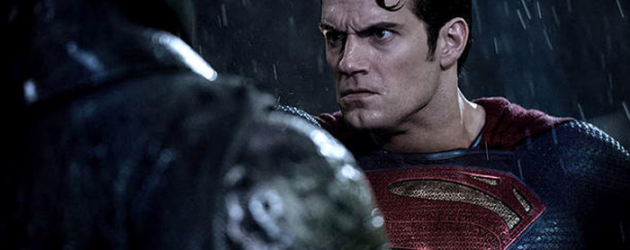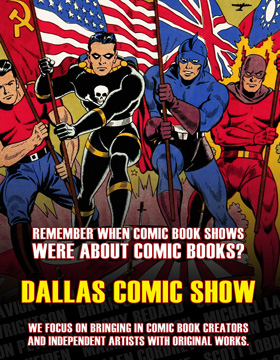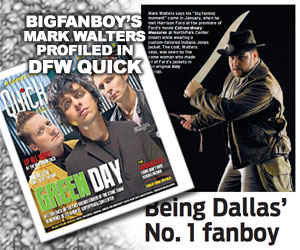[By now, you’ve had an opportunity to watch BATMAN v SUPERMAN: DAWN OF JUSTICE. If not, please don’t read this article. There are spoilers galore, and I want you to have the same chance to see the film without certain plot beats ruined by the discussion. I’ll even try to keep them out of the first couple of grafs, for indexing sake. After that, you’re on your own. A spoiler orphan, if you will.]
I was outside Hall H at San Diego Comic-Con in 2013 when Zack Snyder announced his sequel for MAN OF STEEL would be BATMAN v SUPERMAN. I was certain the resulting screams and applause would dislodge the roof from the Convention Center.
More than two years later, audiences are finally seeing the film, and I simply do not remember a blockbuster that is more divisive. There isn’t a clear consensus on the majority of the movie’s merits. Critics whom I trust and enjoy are almost unified in their disdain, while the fan community can’t decide if the flick was the best superhero film they’ve ever seen, or the worst.
For me, it was neither. And both. It’s no wonder people can’t decide on what they think about the film, because the film can’t ever decide what it is – other than big.
Every decision Snyder made in the film seems to be on scale, and how to pile more, and more, and more, into each scene. By the movie’s third act, I was laughing at each new decision to add another plot point that would inexplicably be either tossed aside or ignored.
The first three words I wrote about the film after leaving the theatre are the ones I keep coming back to: “big, muddled, overwrought.” From a narrative standpoint, this should have been at least two movies, and possibly three. Superman deserved a second film – the whole plot movement with Holly Hunter’s senator leading a McCarthy-esque campaign against The Man of Steel, and his subsequent deification. (Tangent: Is seventeen months enough time to erect a massive statue and monument to the Battle of Metropolis? I think the folks in New York City might disagree.) Rather than shoehorn our introduction to Ben Affleck’s Batman into a Superman movie, he deserves his own flick. Lex Luthor’s obsession with outing Diana Prince and the rest of the world’s meta-humans might have worked well in either of those movies, or could have been its own flick. Instead, they all get shafted by having to share screen time – two hours and thirty-one minutes of it.
The reasoning for this goofiness is clear: Warner Brothers / DC is feeling the pressure to bring the success of the Marvel Cinematic Universe to their shareholders and bank accounts. We’ve known this was coming for years, when the DC Multiverse plan was rolled out.
The reason the MCU worked is because they had nothing to lose by it. Dropping the Nick Fury cameo at the end of IRON MAN was a ridiculous risk that very few people thought would work. However, instead of laying all of their franchise cards on the table at once, Kevin Feige and (to some extent) Joss Whedon knew it would take a unified vision, and time, to make the shared universe work. In contrast, DC has used their standard bearers — Superman and Batman – to will the DC Multiverse into existence. They’ve also proven that they can’t be trusted to let things build over time. They feel like they can’t afford to. In their minds, Marvel has a decade head start, and $3.5 billion in box office across twelve films (with CAPTAIN AMERICA: CIVIL WAR coming in six weeks). They have to jump start the Justice League in theaters, because their shareholders are clamoring for that spandex cash.
I don’t know why WB’s approach seems so ham-handed, where Marvel seems to have gotten it right. Sure, it smacks of the old SOUTH PARK trope: “Simpsons Did It First!” Is the allure of the perpetual franchise, which Marvel has absolutely built the “right way” (never mind the missteps along the previous two decades, and allowing other studios to own key pieces of the puzzle), so incredibly enticing to Warners that they have to throw the kitchen sink at it?
Speaking of the kitchen sink, the titular fight between Man Of Steel and Son Of Gotham featured one of the very few moments of levity in the film, which was not at all intended by Snyder. Batman ripping a sink from a nearby wall and using it to whack Superman in the skull could not have been a stronger metaphor for the film, in toto. There’s a part of me that hopes Snyder did it on purpose, because on some level he knew how absurd the whole thing had become.
If there’s blame to be parsed out for the movie, it doesn’t sit with the actors. You can pull up “Sad Affleck” all you want, but he’s instantly the best Bruce Wayne I’ve seen on screen since Michael Keaton – and that is only on first viewing. There’s a glower, a grimace to his Dark Knight that I don’t think anyone else has been able to capture correctly on film. (Kevin Conroy’s voice encapsulates it perfectly, which is why I usually include him in the “Who’s the best Batman?” Argument, just to be an asshole.) One of the myriad rumors about the studio meddling in this film had the brass telling Snyder to include more Batman in the final cut of BvS, because he tests better than Superman.
Gal Godot brings something really special to our first taste of Wonder Woman: a world-weariness paired with the fire of combat. Damn, I thought she did well. Her standalone film in 2017 had better deliver the goods, because the glimpse we get of her demeanor both as Diana Prince and Wonder Woman is so damned enticing.
I think I would have liked Jesse Eisenberg’s take on Lex Luthor, had he been given more than one dimension to work with. In a better-structured film, I think we would have gotten a solid performance out of him, teetering more on the side of lunacy than either Gene Hackman or Kevin Spacey were allowed to give. Instead, he winds up being a one-note millennial take on the billionaire genius, given a couple of lines of dialogue to explain himself rather than time to grow to fear and revile the character.
I can’t decide what I think of Henry Cavill as Superman, and that’s after two full movies. I liked Brandon Routh, and wish we had more Superman films with him. Of the leads in the film, Cavill is the one I had the least affection for.
Briefly: the cinematography and score both annoyed, as well. I dig Junkie XL, and love Hans Zimmer. Together, their soundtrack is just a whole lot of sturm und drang.
I didn’t notice the movement in action cinema to shake the camera ever-so-slightly during fight sequences until Paul Greengrass did it to excess with the BOURNE films. Now, every time I see it, I want to scream.
Larry Fong, who has worked with Snyder since 300, has never looked this bad (though I wonder how much of that is due to digital effects and how much is his own behind-the-camera work).
BATMAN v SUPERMAN draws from several different pieces of comic plot to form it’s narrative, but the one I despised the most was the inclusion of THE DEATH OF SUPERMAN. The whole damned thing was boorish when DC decided to print it in the first place, without really explaining Doomsday’s origin in the first place. His on-screen presence is explained well enough… and it’s dumber than dumb.
I had to remind myself what the Genesis Chamber was supposed to do in MAN OF STEEL – bring back the Kryptonian race from genetic samples of the dead race. Instead, because Luthor wants to grow an insurance policy against Superman, he adds some of his own blood into the Genesis soup to create… what? Doomsday has Zod’s Kryptonian heat vision, and his weakness to Kryptonite, but nothing else explains why the abomination is actually an abomination. Bleh.
Then, there’s the death of Superman itself. (Look, I said there were going to be spoilers. Your fault, if this “ruins” the movie for you.) The comic plotline works, to some degree, because we’d had over fifty years ingraining the hero into our global culture and psyche. Even “in universe,” he had been around for decades. When the headlines read “World Mourns For Superman,” you believe it.
In the framework of the film, Superman has only been on the scene for two full years. He’s been doing great things, of course, but the people of Earth were still really uneasy with his presence. For the purposes of the film, his death holds a false weight it hasn’t earned.
As for the film’s audience? It’s as if you have this card you’re itching to play, and want the game to be over quickly. Sure, you get the shock value: “I can’t believe they killed Superman.” However, even if you don’t get the little levitating dirt gag on the coffin, you still know he’s going to survive. You know it. His death carries no weight for the audience at all, because they know it’s going to be resolved in JUSTICE LEAGUE. Killing off a main character needs to have a purpose. Consequences. Emotional impact. Otherwise, it’s insulting to the audience, and to the character.
I would hope that Superman has earned a little more respect than that.
There’s one more thing I had on my Festivus List of Grievances for the film: the heavy reliance on dream sequences. They were peppered throughout the flick, from the retelling (for at least the tenth time) of Bruce Wayne’s parents getting shot to the apocalyptic vision of the future where Superman becomes a straight-up murdercape with a whole posse of security contractors and flying demons WHAT THE HELL AM I WATCHING HERE?!?
Since seeing the flick, Nathan Lindsey over at Nonsensical Ramblings has detailed (in a really decently-written piece) what he believes to be the link to the Knightmare storyline of comics, and it at makes a little more sense.
However, if that’s in fact the case, it pisses me off even more. I haven’t read the Knightmare storyline, and I’ll wager the vast majority of moviegoers haven’t, either. This is the same problem I had with the final HARRY POTTER films. There were large swaths of plot that only made sense had you read the Rowling books. Even if your source material is the best-selling series of books in the history of ever, that does not excuse you from lazy scriptwriting. The response “Well, you should have read the comics, because it’s all explained there” simply does not cut it. Neither does “We’ll explain this in future films,” when it’s an integral plot point that clearly explains the motivation of one superhero plotting to kill another one.
Again, we go back to the Marvel films. They understand that the majority of the MCU audiences have rarely, if ever, picked up a comic book, let alone know the difference between Thanos and Darkseid. Their writers understand that. Their directors get it. If the movies are only comprehensible to the fans, then you will not build an audience outside that fan base. It’s that simple.
I wanted to like BATMAN v SUPERMAN. Even after all of the slagging the film received in many circles – not just critics, but comic fans, movie fans, everyone had a hot take on the film – I expected the good bits to outweigh the bad ones. Instead… we got this. Overwrought. Bloated. Lazy storytelling.
And annoying.










So Superman’s “death” is insulting to the audience. What about Gordon’s “death” in THE DARK KNIGHT? People call that film a masterpiece yet the Gordon death is a plot hole that you could drive that flipping semi through. That was a far bigger insult to the audience because it makes absolutely no sense.
How Gordon was handled in The Dark Knight has nothing to do with the argument being presented here.
It’s not a comparison or a “who did it better/worse” it’s purely a matter of how poorly this movie was put together.